|
|
|
Sort Order |
|
|
|
Items / Page
|
|
|
|
|
|
|
| Srl | Item |
| 1 |
ID:
125928
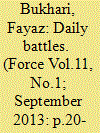

|
|
|
|
|
| Publication |
2013.
|
| Summary/Abstract |
After a decade of peace, the Line of Control (LC) in Poonch sector is hot again following the killing of five soldiers by Border Action Team (BAT) of Pakistan army at Khari Karmara village in Poonch sector on August 6. This was the second BAT action in Poonch sector this year. Earlier, two soldiers were beheaded early January. The intense LC firing started three days after the BAT action only after the army got a go ahead for a befitting reply to Pakistani ceasefire violations in the sector.
|
|
|
|
|
|
|
|
|
|
|
|
|
|
|
|
| 2 |
ID:
087579


|
|
|
|
|
| Publication |
2009.
|
| Summary/Abstract |
Democratic and autocratic states routinely violate their international agreements protecting human rights. Scholars typically link ratification and compliance behavior theoretically but test their models separately; however, if the behaviors are jointly determined then we should treat them that way empirically. We consider how domestic judiciaries influence the joint choice to ratify and comply with international human rights regimes. Using data on the ratification status of states under the Convention Against Torture (CAT), states' torture practices, and a series of measures of judicial effectiveness, we examine whether legal institutions are likely to constrain state behavior and by implication raise the costs of ratification.
|
|
|
|
|
|
|
|
|
|
|
|
|
|
|
|
| 3 |
ID:
124511
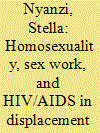

|
|
|
|
|
| Publication |
2013.
|
| Summary/Abstract |
This article aims to disrupt the silence, invisibility and erasures of non-heteronormative sexual orientations or gender identities, and of sex work, in HIV/AIDS responses within displacement and post-conflict settings in Africa. Informed by Gayle Rubin's sexual hierarchy theoretical framework,1 it explores the role of discrimination and violation of the rights of sex workers and of gender and sexual minorities in driving the HIV/AIDS epidemic during displacement. Specific case materials focus on ethnographic research conducted in urban and rural Uganda. Recommendations for policy, practice and programmes are outlined.
|
|
|
|
|
|
|
|
|
|
|
|
|
|
|
|
| 4 |
ID:
119599
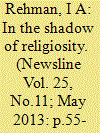

|
|
|
| 5 |
ID:
061575
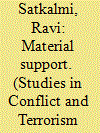

|
|
|
|
|
| Publication |
May-Jun 2005.
|
| Summary/Abstract |
In December 2003, six American-Yemenis were sentenced for terms of seven to ten years for their role in providing material support to Al Qaeda, in violation of Title 18 United States Code §2339B. This article specifically examines the merits of the charge brought against the Six by reviewing precedent that has developed regarding §2339B from 2000 to 2004. This exercise uncovers a controversy over constitutionality, basic rights and due process that, in combination with the facts of the case, could have yielded each of the Six a better deal were the case to go to trial than he received by pleading guilty. Those pleas, made under real pressure from the prosecution, prevented the court from determining whether the Six “had ‘provided’ support to Al Qaeda, or merely ‘received’ it.”
|
|
|
|
|
|
|
|
|
|
|
|
|
|
|
|
| 6 |
ID:
086950
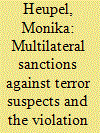

|
|
|
|
|
| Publication |
2009.
|
| Summary/Abstract |
The UN and EU sanctions regimes against suspected terrorists at first clearly violated commonly accepted due process standards. Both organizations gradually reformed the procedures that regulated which individuals and entities were subject to sanctions, yet the UN procedures in particular still evince important shortcomings. While international law scholars have debated how the sanctions regimes must be designed to be consistent with international law, political science scholars have, as yet, largely held back from looking into why the regimes evolved in the way they did. This article suggests that court decisions and proceedings and, in the case of the UN, falling commitment from member states, have prompted the UN Security Council and the Council of the EU to implement limited reforms. However, courts did not challenge the sanctions regimes per se and there was no substantial pressure from civil society actors. Moreover, owing to the competences and working methods of the UN Security Council and the Council of the EU, powerful member states could fairly easily deflect reform proposals from disaffected states and other UN and EU bodies.
|
|
|
|
|
|
|
|
|
|
|
|
|
|
|
|
| 7 |
ID:
090228
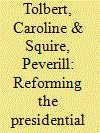

|
|
|
|
|
| Publication |
2009.
|
| Summary/Abstract |
The 2008 presidential nomination was marked by the most aggressive frontloading in recent history; the process was a mess from the outset. Frontloading is the trend in recent presidential nominations in which states schedule their primaries and caucuses near the beginning of the delegate-selection season to have a greater impact on the process. In 1976, 10% of the delegates had been chosen by March 2. In 2008, 70% of the delegates had been chosen by that same date. As part of their ongoing efforts to address frontloading and other problems, both the Democratic National Committee (DNC) and Republican National Committee (RNC) revised the schedules and rules for 2008 presidential primary elections and caucuses.
|
|
|
|
|
|
|
|
|
|
|
|
|
|
|
|
| 8 |
ID:
126579
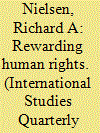

|
|
|
|
|
| Publication |
2013.
|
| Summary/Abstract |
This article provides theoretical and empirical solutions to two connected puzzles in the study of foreign aid and human rights: Do foreign aid donors use aid sanctions to punish repressive states, and if so, why? I show that donors impose aid sanctions selectively. Aid sanctions typically occur when repressive states do not have close political ties to aid donors, when violations have negative consequences for donors and when violations are widely publicized. Using a data set of bilateral foreign aid to 118 developing countries between 1981 and 2004, I find that variation in these factors largely accounts for the differing aid sanctions that result from objectively similar rights violations by the governments of developing countries.
|
|
|
|
|
|
|
|
|
|
|
|
|
|
|
|
| 9 |
ID:
133958
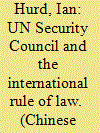

|
|
|
|
|
| Publication |
2014.
|
| Summary/Abstract |
This article considers the relationship between international law and the UN Security Council. The practical power of the Council is constituted at the intersection of its legal framing, its political legitimacy, and the interests of powerful states. This sometimes means the Council has less power than is assigned to it by the UN Charter, but it often means that it has more. It is clear that the Council sits within the international legal system, the legal limits on its action are interpreted in light of prior Council practice, and thus the meaning of 'compliance' and 'violation' of the Charter changes over time. Some transgressions of the Charter are understood as informal amendments to it; others are seen as threats to international peace and security that impel enforcement action. This ambiguity in the law and practice of the United Nations is inherent in the idea of the 'international rule of law'. The Council straddles the unstable boundary between international law and politics, both undermining and reinforcing the distinction between them.
|
|
|
|
|
|
|
|
|
|
|
|
|
|
|
|
| 10 |
ID:
059684
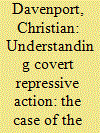

|
|
|
| 11 |
ID:
164493
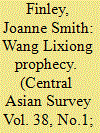

|
|
|
|
|
| Summary/Abstract |
In Your Western Regions, My Turkestan (2007), Chinese dissident Wang Lixiong warned of the ‘Palestinization’ of the Xinjiang question, defined as reaching ‘a critical point in time’ where Uyghurs and Han Chinese enter an interminable ‘ethnic war’. Following the knife attack on Han civilians in Kunming (2014), seen by many as an act of Uyghur terror, Wang reminded us that he had foreseen this trajectory seven years earlier. This article outlines Wang’s six interpretations of ‘Palestinization’ in the Xinjiang context, then shows how tightened regulations on religion and intrusive religious policing was the main catalyst for local retaliatory violence in 2012–2015. I contend that state securitization of religion was counterproductive, heightening societal insecurity and promoting inter-ethnic conflict between Uyghur and Han communities. In Chen Quanguo’s era of ‘de-extremification’, the state’s purported attempt to ‘purify’ Islamic practice continues to be experienced on the ground as violation of pure, halal space.
|
|
|
|
|
|
|
|
|
|
|
|
|
|
|
|
|
|
|
|
|